Fall 2020 Newsletter
Message from the Director
These past couple of weeks have reminded us of how quickly things can change, as we watch leaves fall from trees, continue to wear our masks, return to our remote working stations, and prepare for a new federal administration. We continue to be inspired by our partners and communities and their capacity to support one another as the COVID-19 pandemic is still affecting our communities and requiring us to reimagine how we do our work on a day-to-day basis. Maine Sea Grant continues to focus on bringing partners together to support coastal communities, strengthen Maine’s marine economy, and promote healthy marine ecosystems. And we have received news that we will be able to continue to do this important work moving forward. An external review panel officially recertified the Maine Sea Grant College Program, and the US Senate (by unanimous vote) and House of Representatives reauthorized the National Sea Grant College Program with defined and increased appropriations. Collectively, the Sea Grant programs in the national network are working to highlight and focus efforts on continuing work in Coastal Resilience. The network-wide vision is of coastal communities being more resilient to weather and climate hazards with Sea Grant support to improve planning and risk assessment, disaster preparedness and recovery, resilience design and project implementation, and long standing economic and social inequities. We look forward to working with all of you to continue bringing marine science in this area to Maine’s people.
General Updates
Maine Sea Grant received highest possible performance rating & recertification
After a successful external evaluation in July 2019, Maine Sea Grant received the rating, “Highest Performance: exceeds expectations by an exceptional margin in most areas/aspects,” from an external review panel and, as a result, recertification from the National Sea Grant program. We thank the many partners and stakeholders who took part and made the process a successful one. We look forward to continuing our work with you all to promote science and education for the sustainable development, management, and stewardship of Maine’s marine and coastal resources.
Maine Sea Grant welcomes Diversity, Equity, and Inclusion Program Assistant
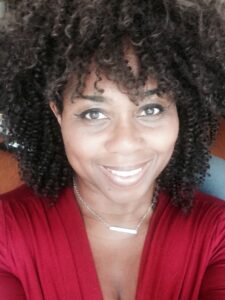
We are pleased to welcome Carmen Phelps, Lead DEI & Racial Equity Consultant for Project 986 Consulting, who will be assisting our Diversity, Equity, and Inclusion Program. Carmen brings to Maine Sea Grant more than 15 years of experience supporting, evaluating, and addressing the diversity, equity, and inclusion values and activities of academic programs and organizations. Her work over the next year will focus on identifying the challenges and opportunities for our Maine Sea Grant program.
Maine Sea Grant launched Buoy Maine, a pitch competition to inspire innovation and support businesses affected by COVID-19
Maine Sea Grant launched Buoy Maine, a new pitch competition to fund innovative projects and ideas to help coastal businesses better address the challenges of operating during the COVID-19 pandemic. Project proposals were due in September, and selected applicants were invited to pitch to a judging panel in October. Buoy Maine will conclude with a virtual public celebration in June 2021. Stay tuned for more information!
Research
Maine Sea Grant funds five research projects through biennial call
For decades, Maine Sea Grant has supported research projects that connect the scientific capacity, talent, and resources of Maine with the needs of coastal communities and stakeholders. Maine Sea Grant has allocated $591,902 to fund five research projects as part of our 2020-2021 biennial funding cycle.
-
-
- Examining Spatial and Temporal Variability in Soft-Shell Clam Recruitment: Establishing a Coastwide Monitoring Program, Brian Beal, Downeast Institute
- Industry-established food safety guidelines for post-harvest handling of edible seaweed towards a more resilient coastal community, Carrie Byron, University of New England
- Rapid detection of Vibrio of oyster management, Laurie Connell, University of Maine
- Market development as mitigation strategy for ecosystem damage and predation by invasive green crab, Jennifer Perry, University of Maine
- Identifying Seed Source Populations Supporting the Culture of Atlantic Sea Scallops in Coastal Maine, Paul Rawson, University of Maine
-
Where do lobsters come from, where do they go, and what happens when there is a change in the status quo?
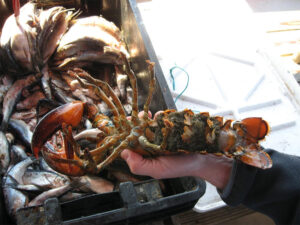
Andrew Goode, a graduate student at the University of Maine working in Dr. Damian Brady’s lab on a research project funded through the National Sea Grant American Lobster Initiative, explains how his team is working to understand how a changing environment affects where and when lobster larvae will be found in the Gulf of Maine. Maine Sea Grant continues to provide leadership and overall coordination for the National Sea Grant American Lobster Initiative, working in collaboration with six other northeast state Sea Grant programs, Sea Grant-funded researchers at more than 20 research institutions, the lobster industry, and marine resource management agencies throughout the Northeast.
COVID has impacted many things, not the importance of monitoring our estuary ecosystems
Maine Sea Grant, in partnership with NOAA Fisheries and the School of Marine Sciences, continued monitoring of the Penobscot River Estuary in 2020 despite the pandemic. Mitigation measures were put in place in mid-May to allow Justin Stevens with Maine Sea Grant and Lauri Leach with University of Maine School of Marine Sciences to conduct biweekly surveys of the Penobscot River Estuary measuring fish biomass using SONAR and visually counting birds and marine mammals.
Extension and Community Engagement
Local radio show Coastal Conversations talks to women who fish for a living
July’s episode of Coastal Conversations, Maine Sea Grant’s monthly public affairs radio show on WERU 89.9 FM hosted by Marine Extension Associate Natalie Springuel, featured three women, Marlene Chapman, Holly Masterson and Giulia Cardoso, exploring how they got into fishing, what inspires them, and what being a woman brings to the profession.
Working toward climate solutions with 18 coastal communities
The Collaborating Towards Climate Solutions project is working with coastal communities in western Penobscot and Passamaquoddy Bays to develop strategies that address and prepare for climate change. Impacts such as flooding, sea level rise, storms, heat waves, ocean acidification, and invasive species magnify the complex issues these towns face. Working with municipalities, the project team will learn about community priorities and challenges and identify potential service provider partners, best practices, and potential networks. The project is led by Esperanza Stancioff, UMaine Extension/Maine Sea Grant, sponsored by the University of Maine Mitchell Center for Sustainability Solutions and Maine Sea Grant, and comprised of a diverse group which includes UMaine Extension/Maine Sea Grant, Maine Department of Environmental Protection, Professors from Bowdoin and University of Maine Machias, and UMaine Climate Institute alongside students from each institution.
Addressing social resilience and increases coastal hazard planning in Midcoast Maine
Marine Extension Team member Kristen Grant will join a multidisciplinary team working to help eight coastal communities in southern Midcoast Maine strategize and develop a shared vision for better regional coordination to address barriers to climate adaptation, reducing the threat to the region’s most vulnerable populations. The team will develop a scenario planning exercise that will allow participating coastal communities identify and address vulnerabilities. This project has been funded by the Maine Coastal Communities Grant Program, Maine Sea Grant, and Bowdoin College.
New equipment to help growing scallop aquaculture industry tested
To help the new but growing farmed scallop industry, Marine Extension Associate Dana Morse has been working with scallop farmers and a design and fabrication company to adapt existing lantern and pearl net washer technology from Japan for use in the United States. Nets require frequent cleaning from biofouling, a typically labor intensive endeavor; however, the new equipment can be operated by one or two people, allowing farmers to make the most of their time at sea. The washer was delivered to Morse in August, and August has been working with Marsden and Bob Brewer to field test the equipment.
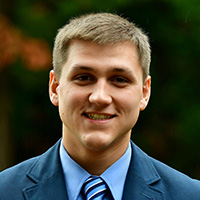
Education and Workforce Development
Maine alumnae and students selected for prestigious NOAA fellowships
Cameron Hodgdon, a Marine Biology PhD candidate at the University of Maine, was one of 10 students in the country to receive a 2020 NOAA Fisheries-Sea Grant Joint Fellowship. Hodgdon will be a Population and Ecosystem Dynamics Fellow and work with Burton Shank of the Northeast Fisheries Science Center to develop a framework to assess and forecast spatio-temporal dynamics of fish stocks in a changing environment. Four University of Maine alumnae and graduate students were selected to be 2021 Knauss Fellows; Marina Cucuzza, Lauri Leach, Gabriella Marafino, and Emma Taccardi will spend one year working with a federal government office transferring science to policy and management.

University of Maine student named Sea Grant-Lobster Institute Scholar
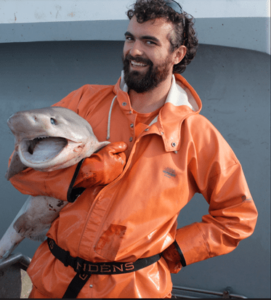
Nathan Willse, a Marine Biology PhD candidate at the University of Maine, received a one-year research assistantship from Maine Sea Grant and the Lobster Institute to support his graduate work. Willse is a researcher in the Chen lab and studies the spatial analysis of lobster traps across New England and the risk they may pose to Atlantic Right whales.
Maine Sea Grant awards scholarships to 10 undergraduate students in Maine
Maine Sea Grant is pleased to announce that 10 students will receive $1,000 awards to support their undergraduate education. Every year, we partner with academic institutions throughout the state to fund undergraduate scholarships for second- and third-year undergraduate students. Recipients for the 2020-2021 scholarships include: Hallie Arno, Jillian Igoe, Olivia Jolley, Kiernan Crough, and Camden Hunt from College of the Atlantic; Lydia Pinard, Sara Piehler, and Tessa Rock from University of New England; Alesha Gregoire from Maine Maritime Academy; and Clair Baker from St. Joseph’s College of Maine.
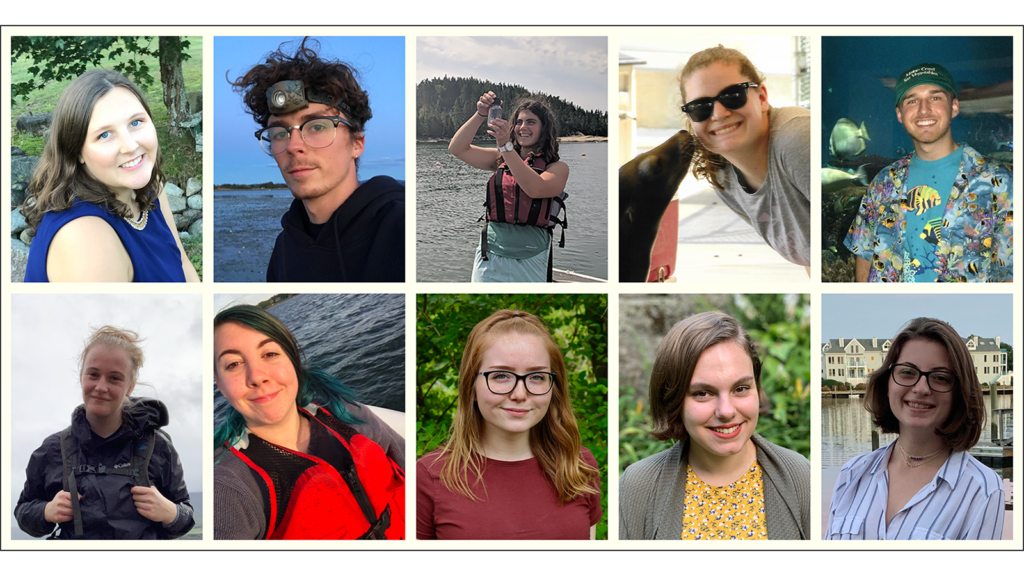
Student produces radio episode on history of Maine’s sardine industry
As part of a summer internship with mentor and Marine Extension Team member Natalie Springuel, Camden Hunt produced and co-hosted the August episode of Coastal Conversations, Maine Sea Grant’s monthly public affairs program on WERU 89.9 FM. Hunt, an undergraduate at College of the Atlantic, used nine historical interviews to explore the lives of people deeply connected to sardines, and their impact on Maine and its communities. These interviews span the entire process of creating a can of sardines, from late night weir-tending, to cutting off fish heads with scissors, to “cartoning” and shipping out truckloads of cans.
Collaborations
American Lobster Initiative
The Sea Grant American Lobster Initiative (ALI) addresses critical knowledge gaps about American lobster and its iconic fishery in a dynamic and changing environment. The initiative supports both a regional extension program, which is coordinated by Maine Sea Grant, and a research program.
Sea Grant announces $2M in support of American Lobster Initiative projects
The American Lobster Initiative, which started in 2019, has added nine new projects to its research portfolio. Of the newly funded projects, four will be lead by scientists from Maine research institutions:
-
-
- Fishing in hot water: defining sentinel indicators of resilience in the American lobster fishery, PI: Joshua Stoll, University of Maine Orono
- Incorporating changes in thermal habitat and growth to improve the assessment of American lobster stocks and spatial distribution in the Gulf of Maine, Georges Bank and southern New England, PI: Yong Chen, University of Maine Orono
- Testing and developing effective non-invasive female maturity assessment methods and protocols for the American lobster (Homarus americanus): PI: Jesica Waller, Maine Department of Marine Resources
- Understanding and improving spatial distribution projections for lobster: Considering predation and building expert consensus PI: Kathy Mills, Gulf of Maine Research Institute
-
Alliance for Maine’s Marine Economy
The Alliance for Maine’s Marine Economy, a responsive network dedicated to the growth of a vibrant marine economy for Maine, is coordinated by a Marine Extension Team member. Maine Sea Grant is excited to share the Alliance’s work with you.
Pandemic Pivot: Innovation and Resilience in Maine’s Seafood Community
The Alliance hosted a discussion series featuring industry representatives from across the seafood value chain who share how COVID-19 has impacted their businesses and what innovative strategies they are using to adapt to changing markets and consumer needs. The goal is to share stories, innovations, and to inspire people to try new things. Featured speakers include: Curt Brown from Ready Seafood, Brianna Warner from Atlantic Sea Farms, Ian Mayo from Mayo Enterprises, Annie Tselikis from Maine Lobster Dealers’ Association, Bill Mook from Mook Sea Farm, Matt Brown from SoPo Seafood, Jen Levin from Gulf of Maine Sashimi, Mike Gaffney from Eros Oysters, Patrick Arnold from New England Ocean Cluster, Thor Sigfusson from Icelandic Ocean Cluster, Ben Conniff from Luke’s Lobster, and Brian Langley from the Union River Lobster Pot, Boe Marsh from Community Shellfish, and Dianne Tilton from Downeast Institute .
Maine Aquaculture Hub
The Maine Aquaculture Hub was formed to help strengthen the aquaculture industry in Maine. Maine Sea Grant is a founding partner, coordinating all activities, and a member of the Hub’s Steering Committee.
Maine Aquaculture Hub invests more than $200K in projects to support aquaculture innovation
The Maine Aquaculture Hub has funded five projects seeking to strengthen the aquaculture industry in Maine:
-
-
- Keith Butterfield of Butterfield Shellfish Company, an oyster farm in Casco Bay, will be testing a device that mechanically flips oyster bags.
- Caitlin Cleaver, a Maine Aquaculture Coop board member and University of Maine PhD candidate, will test a sea scallop lantern net washer and determine the feasibility of sharing the machine between farmers.
- Nate Perry, owner of Pine Point Oyster Company, will work with Bigelow Laboratory and Beacon Analytical, in support of the development of a less expensive biotoxin testing method for roe-on scallops.
- Peter Rahn, Atlantic Sea Farms’ production manager and food safety specialist, will add a kelp blancher to increase the company’s capacity for processing kelp.
- Robert Wood of the Downeast Fisheries Partnership, will try to expand mussel operations and opportunities by testing cultured seed. Standard practice is for mussel farmers to use wild-recruited seed, which can be unreliable.
-
Maine Aquaculture Hub continues work toward building a state-wide aquaculture roadmap
In August, the Maine Aquaculture Hub convened regulatory and government officials who work with aquaculture as part of the 10-year Maine Aquaculture Roadmap planning process. The meeting was one of many focus group discussions targeting all stakeholders who interact with aquaculture in one way or another. The input will be used to help shape a roadmap for the next 10 years of aquaculture development.
In the News
-
- The Guardian interviewed and quoted Extension Professor and Climate Change Lead Esperanza Stancioff, drawing on her expertise to explain how the climate crisis is affecting the Maine lobster fishery.
- Maine Women Magazine featured Marine Extension Associate Jaclyn Robidoux and her extension work in its July 2020 issue (page 18).
- Marine Extension Associate Natalie Springuel shared findings from her sabbatical research on how two communities recovered from economic and social collapse after the Canadian cod moratorium in The Island Journal.
- Maine Biz and Landings (September issue, page 9) highlighted the Buoy Maine competition.
- U.S. News and World Report, News Center Maine, Maine Biz, Wiscasset Newspaper, Boothbay Register, and Seafood Source covered the American Lobster Initiative (ALI) $2M funding announcement or funded projects.
- The MA Lobstermen’s Association highlighted the American Lobster Initiative and introduced Amalia Harrington, the Northeast Regional Lobster Extension Project Coordinator, in their June newspaper (page 24).
- The Maine Lobstermen’s Association highlighted the Maine Aquaculture Hub awards in the September issue of Landings (page 26).
Upcoming Events
-
- December 1, 2020, 10:30 am – 12:00 pm. The Art and Science of Virtual Facilitation – Session 1. Maine Sea Grant in partnership with UMaine Cooperative Extension and New Hampshire Extension is offering a two-part training focusing on learning and practicing virtual facilitation techniques.
- December 2, 2020. 7:00 pm. Collaborative Chats: Successful Research Partnerships in the Lobster Industry. Aubrey Ellertson, a Research Biologist at the Commercial Fisheries Research Foundation, and Mark Sweitzer, a CFRF Board Member, will discuss The Lobster and Jonah Crab Fleet: A Unique Partnership Between Lobstermen and Scientists. This is the fourth webinar of a series supported by Maine Sea Grant, the Department of Marine Resources, and the University of Maine Lobster Institute.
- December 10, 2020. 5:00 pm – 7:00 pm. Aquaculture Lease Hearings 101. Maine Sea Grant is facilitating and the Department of Marine Resources is hosting a learning session for members of the public that wish to effectively engage in the aquaculture lease hearing process. Each session is limited to the first 40 individuals who register.
- December 11, 2020. 9:30 am – 11:30 am. Aquaculture Lease Hearings 101. Maine Sea Grant is facilitating and the Department of Marine Resources is hosting a learning session for members of the public that wish to effectively engage in the aquaculture lease hearing process. Each session is limited to the first 40 individuals who register.
- December 15, 2020. 1:00 pm – 3:00 pm. Aquaculture Lease Hearings 101. Maine Sea Grant is facilitating and the Department of Marine Resources is hosting a learning session for members of the public that wish to effectively engage in the aquaculture lease hearing process. Each session is limited to the first 40 individuals who register.
- January 7 & January 21, 2020. 1:30 – 3:00 pm. The Art and Science of Virtual Facilitation. During the COVID-19 pandemic, virtual meetings have become a mainstay for successful communication and collaboration in organizations and communities. Virtual formats bring their own challenges and opportunities, and good facilitation takes skill and practice. The Art and Science of Virtual Facilitation training will teach participants new facilitation tools to use with new or ongoing groups.
*Photographs of students and staff not wearing masks were taken prior to the coronavirus pandemic. The University of Maine and University of Maine at Machias follow federal and state Centers for Disease Control and Prevention health and safety guidance, which includes social distancing and use of face coverings for the start of the 2020–21 academic year.
